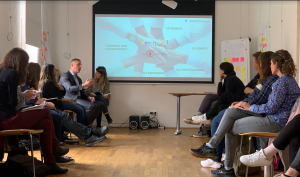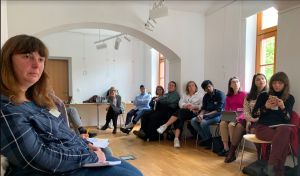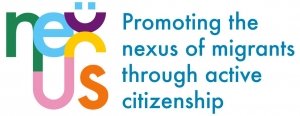Civic Education Training For The Digital Age
During April 25-28 April, the LTT activity “Civic Education Training For The Digital Age” organised by KIC and the rest of the NEXUS team, took place in the capital of Slovenia, Ljubljana.. Although it was planned to be held in Malta, it was decided to be held in Slovenia since KIC team in charge of organising the activity are based there.
The planned date for this training activity was March 2021, but given the travel restrictions from COVID-19, all consortium partners decided to postpone it until the restrictions were over. Therefore, it took place in April 2022 during the same week as TPM4. It was found that this was an appropriate decision, since at this time the state of the project was optimal for dissemination during the activity and the consortium had the appropriate time to prepare for the activity.
The training was designed to enable current and future educators to use and understand digital democracy tools and make it easier for them to engage with their students as active citizens in decision making and when informing policy makers.
18 participants took part in the training invited by partner institutions coming from Croatia, Italy, Slovenia, Sweden and Spain, with a very diverse background and profiles: current and future educators in the field of Education and Social Sciences (Translation; Language learning; Human Rights and Multilevel Governance, etc.), together with PhD students in the field of Economics and Entrepreneurship.
During the training, participants were equipped with the knowledge and resources needed to influence decision-making and inform policymakers, through campaigns, advocacy, petitioning, and monitoring public policy.
They also had the opportunity to test and reflect on numerous tools that were provided by the NEXUS project resources: the NEXUS Civics 4.0 MOOC, the NEXUS4CivicsCommnity, and the NEXUS Inventory of digital tools for open democracy and digital citizenship education.
During day 1, in order to inspire participants in the topic of the training, and before starting the main work, the event started with inspirational talks on civic-tech initiatives (STOP Birokraciji (https://www.stopbirokraciji.gov.si/en/home), SledSledilnik (https://covid-19.sledilnik.org/sl/stats). Then, participants took part in a collaborative workshop in order to research existing civic-tech solutions for specific fields, providing. They provided top-down and bottom-up initiatives within their local contexts, such as city issues of mobility, animal rights, women rights, migrants, etc. Finally, everyone worked together to reflect on different aspects, such as why they were not aware before, or whether they would use these tools in the future, advantages and disadvantages, etc.
Day 2 started with a first workshop on empathizing and defining the problems and challenges existing in the field of community engagement and participation, and why it is important to reflect on this. In a subsequent workshop on Design thinking, participants were split into rotating groups to reflect on different questions in order to engage them and reflect on how to make the context local: What is the role of schools and universities in facilitating civic engagement? / What is the stent of student engagement in different spheres of society? / How can civics be taught in 2020-2030? / What are students’ perceptions of their communities and their attitudes towards public institutions politics?
Participants discussed these questions in groups and then presented findings with the whole group to have a global reflection. Between the topics discussed, there were migration, environment awareness, elder people, human rights, digital source criticism and literacy… Also, the importance of how teachers should be more open minded about existing issues and make students think for themselves (for example, if a problem can be solved by the university community, they should scale it, make a petition or proposal of projects, go further, mobilize between them and join to do something within their contexts, etc.).
Day 3: After gaining insights from experts, gathering field data, and participating in various activities that helped them understand how to create campaigns, increase citizen participation and empower their peers within and beyond their universities and local communities, the last day was focused on getting ready for putting their projects into action.
After reflecting on the existing problems, challenges and tools for digital civic participation from the previous day, they had to think of prototyping and testing new solutions for these and developed project initiatives. The participants were split into 6 groups according to the previous day’s results (the main contexts identified for migrants, refugees, children, youth, elder people and teachers), and thought of civic education solutions/proposals to make them digital using a Person Canvas template. Then, participants presented their projects initiatives, with really insightful ideas.
There was also time for social activities, as from the first day, participants and organisers shared lunches and dinners where they continued to exchange ideas on active digital participation. In that sense, and following the principles of the Project, the welcome dinner and all the caterings for the event were provided by Skuhna, a restaurant operating on the principles of social entrepreneurship, offering authentic ‘world dishes’ from various parts of Africa, Asia, and South America prepared and presented by migrants from these continents.
After the event, participants continued to reflect on their participation in the event on their social networks.







